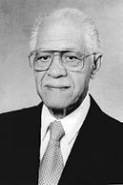In today’s feature, we honor the long career of Dr. Charles DeWitt Watts (1917-2004).

Dr. Watts, the first African American to be certified by a surgical specialty board in North Carolina, spent a half-century advocating for civil rights and medical equity. In addition to playing a key role in founding Lincoln Community Health Center (which served people regardless of their ability to pay), he pushed for the certification of black medical students (1).
Segregation in the United States only came to an end (officially, if not always in practice), with the The Civil Rights Act of 1964. Dr. Watts had studied medicine at Howard University in Washington, DC, but moved to Durham, North Carolina, in 1950. He set up a private practice and later became chief of surgery at Lincoln Hospital, one of the only hospitals in America, north or south, that allowed Black doctors to perform surgery (2).
Dr. Watts’ frustrations were driven not only by the obstacles blocking Black doctors and surgeons from practicing, but also the lack of health care access for Black patients. He fought to expand that access, a battle he was still very much engaged in even into his later years and retirement. When Lincoln hospital was threatened with closure in the 1970s, Dr. Watts aided in turning it into a community health center instead (3).
later become a clinical professor of surgery and director of student health at Duke University Medical School and North Carolina Central University respectively. Dr. Watts also served as vice president and medical director for North Carolina Mutual Life Insurance Company, which is still the largest Black-owned insurer in America. The Duke School of Medicine created the Charles Watts Travel Award in 2002, in his honor, allowing students and faculty to travel “around the world in the study of culturally specific medicine”. But Dr. Watts is most remembered for something that doesn’t always make the papers; he was a “well-trained and gentle surgeon,” whose students considered him an ally, inspiration, and visionary, and who worked tirelessly for health access and equity (2). This commitment to human rights and dignity is worth celebrating as his most enduring legacy.
___
- “Black History Month” Duke University MCL and Archives. https://guides.mclibrary.duke.edu/blackhistorymonth
- “The Remarkable Legacy of Dr. Charles DeWitt Watts,” BCBS North Carolina. https://blog.bcbsnc.com/2016/02/the-remarkable-legacy-of-dr-charles-dewitt-watts/
- Charles DeWitt Watts. Washington Post. https://www.washingtonpost.com/archive/local/2004/08/13/charles-dewitt-watts-86/424d3974-d804-4793-981f-247bc80c7bc1/